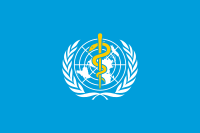
Photo from wikipedia
INTRODUCTION The Accreditation Council for Graduate Medical Education provided guidelines, in 2013, regarding 13 clinical procedures pediatric residents should learn. Previous studies show that, when asked, general pediatricians (GPeds) self-report… Click to show full abstract
INTRODUCTION The Accreditation Council for Graduate Medical Education provided guidelines, in 2013, regarding 13 clinical procedures pediatric residents should learn. Previous studies show that, when asked, general pediatricians (GPeds) self-report performing these procedures infrequently. When examined using the knowledge translation model, this low procedural performance frequency, especially by GPeds, may indicate a problem within the primary care landscape. METHODS This was a descriptive study using the Partners For Kids, an accountable care organization, database to obtain how frequently each of the procedures was performed for a geographically representative sample of GPeds in central Ohio. RESULTS A total of 296 physicians participated in Partners For Kids. Nearly one-third practiced for more than 15 years (n = 83, 28%) and one-third also lived in a rural region (n = 78, 26.4%). The most commonly billed procedure was administering immunizations (n = 79,292, 92.3%); the least was peripheral intravenous catheter placement (n = 2, 0.002%). Most procedures were completed in the office-based setting. DISCUSSION General pediatricians in central Ohio do not frequently perform the 13 recommended procedures of Accreditation Council for Graduate Medical Education. Evaluation of this problem using the knowledge translation model shows that potential barriers could be inadequate training during or after residency or more likely that these procedures are not necessary in GPeds' current scope of practice. The next step should be to see, from the practitioner's perspective, what procedures are important to their daily practice. Adapting this knowledge to the local context will help target continuing medical education/continuing professional development interventions.
Journal Title: Journal of Continuing Education in the Health Professions
Year Published: 2020
Link to full text (if available)
Share on Social Media: Sign Up to like & get
recommendations!